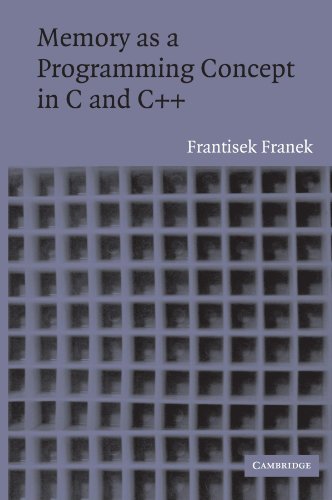Memory as a Programming Concept in C and C++ book download
Par campbell carolyn le jeudi, août 27 2015, 21:11 - Lien permanent
Memory as a Programming Concept in C and C++ by Frantisek Franek


Memory as a Programming Concept in C and C++ Frantisek Franek ebook
Page: 272
Format: chm
ISBN: 0521520436, 9780521520430
Publisher: Cambridge University Press
Achingly, heartbreakingly clear, because some hardware incents you to pull out the big guns to achieve top performance, and C++ programmers just are so addicted to full performance that they'll reach for the big red levers with the flashing The facts: The C++11 memory model and what it requires you to do to make sure your code is correct and stays correct. Is to figure out when (and how) to free the allocated memory. Warning 423: Creation of memory leak in assignment to 'p' long *p; p = malloc(4); Warning 433: Allocated area not large enough for pointer char c; while ((c = getc(fp)) ! IMHO knowledge of C++ and Java enables one to write better C code and even allows OOP concepts to be used. Indeed, both in C and certainly in C++, it is uncommon to see a screenful containing only well defined and conforming code. Why do professional programmers write code like this? This was used when programming “the old way” in C or C++, when alternative techniques where not so widely known, but you usually don't see this anymore in modern code. Because most programmers do not have a deep So why doesn't the compiler reorder the members in the structure to optimize memory usage, and execution speed? What are IMHO concepts improve readability and provide clearer programmatic abilities as requested long ago by the likes of Alexander Stepanov in 'Elements of Programming'. I'd loved to have had this available ten years ago when I was first blundering through these concepts. Because there are no memory management concepts used here, there is no general solution to this problem and the programmer makes errors for sure as the code grows. I want to know what are the semantic differences between the C++ full concepts proposal and template constraints (for instance, constraints as appeared in Dlang or the new concepts-lite proposal for C++1y). In this post I will discuss FlexeLint, a mature static analysis tool for C and C++ from Gimpel Software. Programming correct C and C++ is particularly hard. C++11 introduced a standardized memory model. Static analysis is a powerful technique for quickly finding programming defects in the earliest stages of development and is especially useful for statically typed languages like C and C++. There are a lot of alternatives to this approach.
Biotechnology: Academic Cell Update Edition ebook download